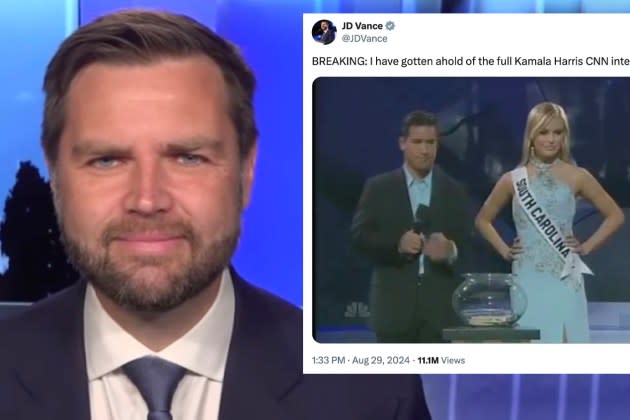JD Vance refused to apologize to Caitlin Upton for posting an embarrassing 2007 video clip of her during a recent appearance on CNN. Upton, a former Miss Teen USA contestant, took to social media to express her disappointment at the resurfacing of the clip and spoke out against online bullying. In the clip, Upton is seen struggling to answer a question during the pageant, resulting in a rambling and incoherent response that went viral and led to severe backlash and even suicidal thoughts for Upton. Despite Vance’s refusal to apologize, he expressed sympathy for Upton and stated that he hopes she is doing well.
In a 2015 interview with New York Magazine, Upton opened up about the dark moments she experienced after the video clip went viral, including thoughts of suicide. She revealed that she went through a period of severe depression but was able to keep it hidden from most people, except for those she trusted. Upton’s recent message on social media reflects her ongoing struggle with the consequences of the viral clip and her desire for an end to online bullying. Despite the passage of 17 years since the incident, Upton continues to face the repercussions of that moment in the public eye.
During his appearance on CNN, Vance attempted to deflect the focus from the Upton incident by discussing other topics such as health care and inflation. However, he ultimately came back to the issue and offered what appeared to be unsolicited advice to Upton, suggesting that the best way to deal with such situations is to laugh at oneself. While expressing sympathy for Upton, Vance refused to apologize for posting the video clip, referring to it as a joke. He described the current state of politics as boring and proclaimed that he would not apologize for the incident.
Upton’s message about the need to stop online bullying and social media harassment resonates in the current digital landscape, where public figures and private individuals alike can face severe consequences for past mistakes or embarrassing moments. The resurfacing of old videos or posts can have a lasting impact on individuals’ mental health and well-being, as seen in Upton’s case. Despite the passage of time, the effects of online bullying can linger, highlighting the need for increased awareness and actions to combat such behavior. Upton’s call to end online bullying serves as a reminder of the importance of compassion and empathy in online interactions.
The incident involving Upton and Vance sheds light on the impact of past mistakes in the age of social media and online shaming. The viral nature of the video clip and the subsequent backlash against Upton highlight the power of the internet to amplify moments of embarrassment and humiliation. Upton’s experience serves as a cautionary tale about the potential consequences of online behavior and the importance of treating others with kindness and respect. The responses from Vance and Upton underscore the complex dynamics of public apologies and the challenges of navigating personal missteps in the digital age.


